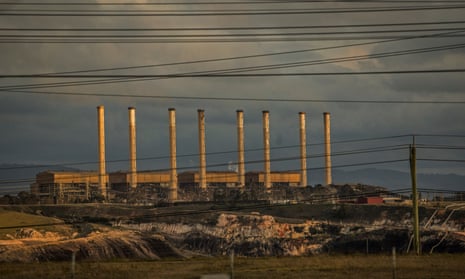A diverse group of religious, education and renewable energy sector leaders have gathered in Canberra to pressure Scott Morrison to cut $7.7bn worth of subsidies for fossil fuels in the budget.
The coalition, organised by climate change advocacy group 350 and WWF, says as the government seeks to tackle the deficit community pressure is building to cut fossil fuel subsidies and invest instead in areas including health and renewable energy.
The $7.7bn of subsidies include $5.5bn of non-agricultural fuel tax credits, $1.24bn for concessional rates of fuel excise on aviation fuel and $650m of tax deductions for exploration and prospecting by the mining industry.
Earlier in April a poll by Reachtel found that 48% of respondents thought fossil fuel subsidies were too high, compared with 25% who said they were about right and 8.5% who said they were too low.
Ending the subsidies was the most popular option for budget repair (36% in favour), ahead of reducing negative gearing benefits, raising the GST, increasing capital gains tax and tightening superannuation tax concessions – options which all got less than 20%.
A majority of the 2,644 respondents wanted the money saved spent on health (27.5%) and/or growing renewable energy (26.3%) instead.
Last month almost 50 organisations urged the government to end fossil fuel subsidies. “The government is spending money through the emissions reduction fund to reduce emissions while also providing subsidies to pollute through the measures listed above,” they said. “This makes little environmental and economic sense.”
The chief executive of the renewable energy company Roofjuice, Nigel Morris, said: “If you look up the definition of ‘innovation’ it doesn’t say ‘support a declining, obsolete industry with massive subsidies’.
“It’s time the government started investing in the future, not the past. The fossil fuel sector is on the decline … The only thing slowing down this transition now is the billions in handouts to the fossil fuel sector.”
A former Anglican bishop, George Browning, said: “Science and Christianity are on the same page in urging human responsibility in the face of escalating climate change.” He added: “The clock is ticking. We cannot sit on our hands any longer.”
A Uniting church minister, Seforosa Carroll, who manages church partnerships in the Pacific region, said: “The mining and burning of fossil fuels is destroying our islands and our cultural heritage. We bear the brunt of the damaging effects of climate change to our ecosystems and livelihoods.
“The continuing multibillion-dollar subsidies by the Australian government to fossil fuel companies will in the long term have a serious impact on the already vulnerable Pacific communities by further undermining their future.”
An Australian Education Union ACT branch campaigns officer, Luke Stickels, said: “Continuing to fund polluters when we know the damage being done to the environment is unforgivable intergenerational theft. It is grossly foolish and unfair.”
In comments on Friday welcoming Australia’s decision to sign the Paris climate agreement the Greens leader, Richard Di Natale, said domestic legislation would fail to give practical effect to the agreement.
“In Australia we have the Liberal, National and Labor parties that have, in the past year, cut our renewable energy target, approved huge new coalmines, supported fossil fuel subsidies, taken donations from fossil fuel companies, and set pollution-reduction targets well below what the science says is necessary,” he said.
Separate Parliamentary Budget Office costings for the Australian Greens estimate fossil fuel subsidies cost the budget $6bn a year and more than $21bn could be saved over a four-year period if they were cut.
That figure did not include boosting the fuel excise on aviation fuel but proposed cutting funding for carbon capture and storage.
On 19 April the Greens senator Lee Rhiannon wrote to the leaders of the Liberals, Nationals and Labor asking them to refuse donations from fossil fuel companies.
Rhiannon said the millions of dollars given by fossil fuel companies had “sapped the vitality and integrity of Australia’s response to climate change”.

Comments (…)
Sign in or create your Guardian account to join the discussion